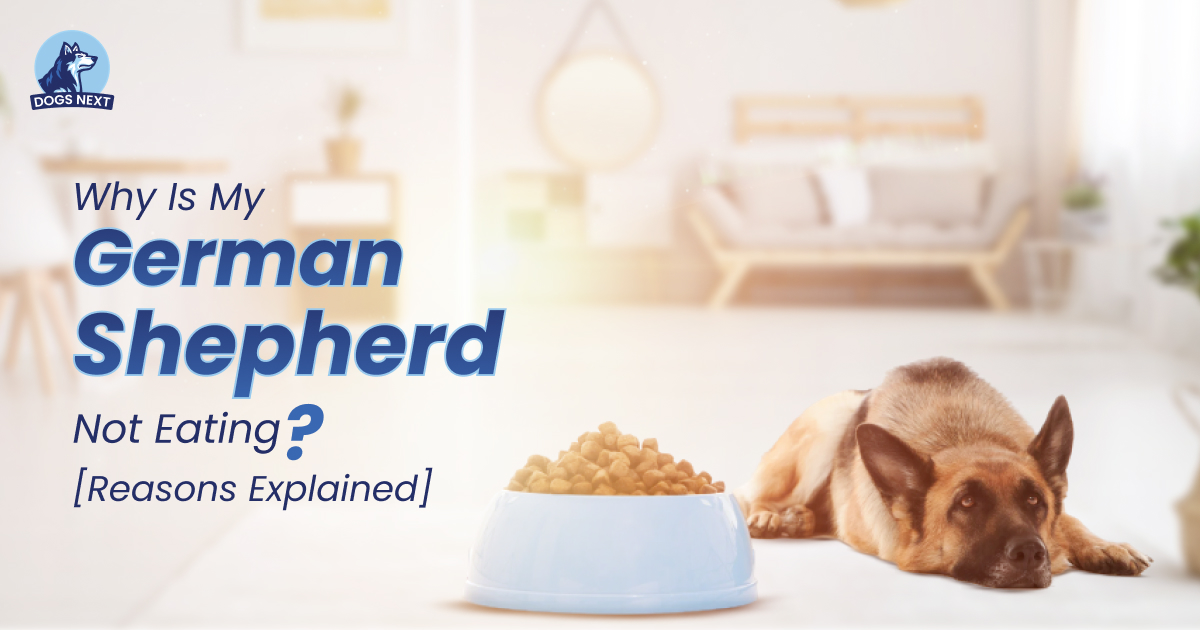If your German Shepherd suddenly stops eating, it can be a cause for concern. As a loving pet owner, you want to make sure your furry friend is healthy and happy, but you may not know why your German Shepherd is not eating. In this article, we will explore the common causes of appetite loss in German Shepherds and provide solutions to help them regain their appetite.
Usually, your dog won’t eat if he is sick (bacteria or viruses), sensitive stomach, is nervous, is stressed (new surroundings or loud noises), or have dental pain.
We will discuss the potential medical conditions that can cause a loss of appetite, as well as the behavioral reasons that may be contributing to the issue. We’ll also share some tips for encouraging your picky eater to start enjoying their meals again. So, let’s get started and find out why your German Shepherd is not eating.
Common Reasons Why German Shepherds May Lose Their Appetite
There are several reasons why German Shepherds may lose their appetite. Here are some of the most common causes:
Illness or medical conditions
A loss of appetite can be a symptom of various medical conditions, such as infections, digestive issues, dental problems, or even cancer. If your German Shepherd has other symptoms besides not eating, such as vomiting, diarrhea, or lethargy, you should take them to the vet for a check-up.
Stress or anxiety
German Shepherds can be sensitive dogs and may experience stress or anxiety in certain situations, such as when there are changes in their environment or routine, or when they are separated from their owners for a long time. Stress can affect their appetite and cause them to stop eating.
Aging
As German Shepherds get older, their metabolism slows down, and they may not need as much food as before. They may also have dental issues or other health problems that make eating difficult or painful.
Boredom or lack of stimulation
German Shepherds are intelligent and active dogs that need mental and physical stimulation to stay healthy and happy. If they are not getting enough exercise or playtime, they may lose interest in their food and become picky eaters.
Change in diet
If you recently changed your German Shepherd’s diet, they may not like the new food or may need some time to adjust to it. It’s important to transition to a new diet gradually to avoid upsetting their stomach or causing digestive issues.
By understanding these common causes of appetite loss in German Shepherds, you can start to identify what might be causing your dog’s lack of appetite and take appropriate action to help them start eating again.
Medical Conditions That Can Cause A Loss Of Appetite In German Shepherds
If your German Shepherd is not eating, it may be due to an underlying medical condition. Here are some common medical conditions that can cause a loss of appetite in German Shepherds:
| Medical Condition | Symptoms | Treatment |
| Infections | Fever, vomiting, diarrhea, lethargy | Antibiotics |
| Digestive issues | Bloating, gas, abdominal pain, diarrhea, vomiting | Dietary changes, medication |
| Dental problems | Tooth decay, gum disease, oral pain | Dental cleaning, extractions, pain medication |
| Cancer | Weight loss, lethargy, difficulty breathing, changes in appetite | Surgery, chemotherapy, radiation therapy |
| Kidney or liver disease | Excessive thirst and urination, vomiting, diarrhea, lethargy | Medication, dietary changes |
It’s important to note that these are just a few examples of medical conditions that can cause a loss of appetite in German Shepherds. If you suspect that your dog may be suffering from a medical issue, you should take them to the vet for a proper diagnosis and treatment.
Nutritional Requirements and Feeding Habits of German Shepherds
German Shepherds have specific nutritional requirements that are essential for their health and well-being. Here are some important factors to consider when it comes to feeding your German Shepherd:
High-quality dog food
Look for a dog food that is specifically formulated for large breed dogs and meets the nutritional guidelines set by the Association of American Feed Control Officials (AAFCO).
Portion control
German Shepherds are prone to obesity, so it’s important to feed them the appropriate amount of food based on their age, weight, and activity level.
Frequent meals
Rather than feeding your German Shepherd one large meal per day, consider dividing their food into two or three smaller meals to help prevent digestive issues and maintain a healthy weight.
Freshwater
Always provide your German Shepherd with fresh, clean water to ensure proper hydration.
Treats and table scraps
While it’s tempting to give your dog treats and table scraps, it’s important to limit their intake to avoid overfeeding and potential health issues.
Behavioral Reasons Why German Shepherds May Not Want to Eat
In some cases, a German Shepherd may not want to eat due to behavioral reasons. Some common reasons include:
- Stress or anxiety
- Change in routine or environment
- Boredom with food
- Overfeeding or free-feeding
If you suspect that your German Shepherd is not eating due to behavioral reasons, try to identify the underlying cause and make changes to address it.
Tips For Encouraging a Picky German Shepherd to Eat
If your German Shepherd is a picky eater, there are several things you can do to encourage them to eat:
- Offer a variety of foods to keep mealtime interesting
- Try adding wet food or a food topper for extra flavor
- Feed smaller, more frequent meals
- Make mealtime a positive experience by providing praise and affection
When To Seek Veterinary Care for A German Shepherd Who Won’t Eat
If your German Shepherd refuses to eat for more than 24 hours or is showing other symptoms such as vomiting or diarrhea, it’s important to seek veterinary care. A loss of appetite can be a sign of a serious underlying medical condition, and prompt treatment is crucial for your dog’s health.
It’s important to remember that every dog is unique, and there are a variety of reasons why a German Shepherd may not want to eat. By understanding the common causes and taking steps to address them, you can help ensure that your furry friend stays healthy and happy.
Frequently Asked Questions
Q: How long can a German Shepherd go without eating?
Ans: Generally, a healthy German Shepherd can go up to 5 days without eating, but it’s important to seek veterinary care if your dog has not eaten for more than 24 hours.
Q: How can I increase my German Shepherds appetite?
Ans: You can try increasing the palatability of their food by adding low-sodium broth or wet food, offering small and frequent meals, and ensuring that their food is fresh and stored properly.
Q: Why is my dog not eating but acting normal?
Ans: There can be several reasons why a dog is not eating but acting normally, including stress, a change in their environment or routine, or a mild illness. It’s important to monitor their behavior and consult with a veterinarian if their loss of appetite persists.
Q: Why are German shepherds, picky eaters?
Ans: German Shepherds can be picky eaters due to their sensitive digestive system and individual preferences. It’s important to provide them with a balanced diet that meets their nutritional needs and to avoid feeding them table scraps or human food that may cause digestive upset.
Conclusion
In conclusion, a loss of appetite in your German Shepherd can be a cause for concern, but there are many reasons why it may occur. From medical conditions to behavioral issues, understanding the root cause of your dog’s loss of appetite is crucial in providing them with the care they need. By following the tips and advice provided in this article, you can help ensure that your German Shepherd stays healthy and happy.
Remember, if your German Shepherd continues to refuse food for more than 24 hours, or if they are displaying other concerning symptoms, seek veterinary care immediately. With proper care and attention, you can help your furry friend get back to their normal, healthy self.
So, if you’re asking yourself “Why is my German Shepherd not eating,” take a deep breath and consider the possibilities. With a little patience and effort, you can help your dog regain their appetite and continue to be the loyal, loving companion that you know and love.

I’m David, an expert contributor and writer, with two furry friends of my own, I know the challenges of raising and caring for dogs. From training to nutrition and health, my goal is to provide valuable insights and advice to help create strong bonds and happy, healthy lives. Find me in Twitter.




